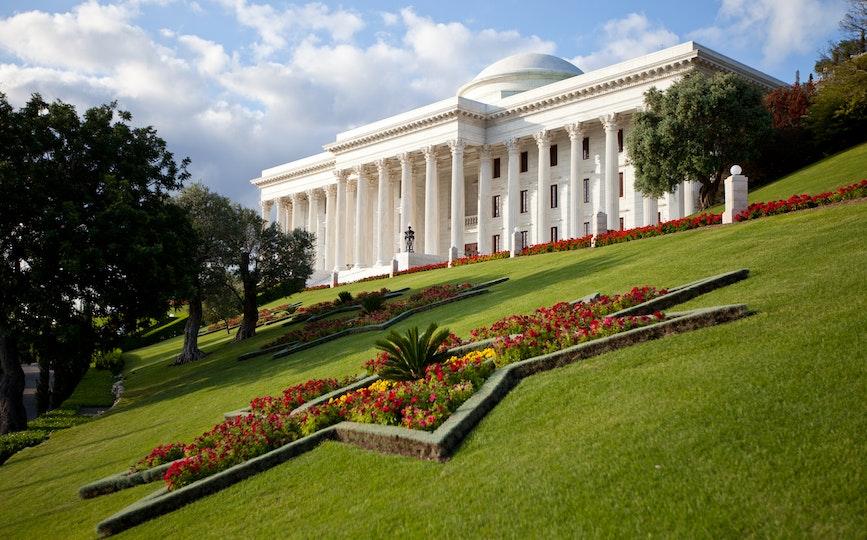The Spread of the Baha’i Faith Began in a Garden 160 Years Ago
The Baha’i faith began 1863 when Baha’u’llah announced his station as a Manifestation of God in the Garden of Riḍván along the banks of the Tigris River in Baghdad.
Commentary by Pete Haug
As religions go, the Baha’i Faith is a youngster. It began in May 1844, when a young merchant in Shiraz, Persia (now Iran), announced he fulfilled Muslim prophecies associated with the end times. Known today as the Bab, he prophesied the imminent advent of one greater than himself.
Within a decade, one of his followers, while incarcerated for his beliefs, received an intimation that he was that fulfillment, the culmination of religious expectations throughout the world. That man, Baha’u’llah, is the founder of the Baha’i Faith.
It was 1863 when Baha’u’llah announced his station in the Garden of Riḍván along the banks of the Tigris River in Baghdad. Baha’is throughout the world now observe this 12-day Riḍván Festival dating from that announcement, that he, Baha’u’llah, was the one foretold by the Bab. He, and many of the Bab’s followers, had been living in exile in Baghdad for a decade.
Baha’u’llah made his announcement on the eve of subsequent exiles to Constantinople, Adrianople and finally, in 1868, to Akka, a prison city on the eastern Mediterranean. There he spent his remaining 24 years, guiding the growing Baha’i community.
International spread of the Baha’i Faith
After Baha’u’llah’s passing in 1892, the faith began a systematic global expansion directed by ‘Abdu’l-Baha, his son and appointed successor. ‘Abdu’l-Baha passed away in 1921 leaving a Will and Testament appointing his grandson, Shoghi Effendi, as “Guardian” of the Baha’i Faith. Shoghi Effendi proceeded to implement ‘Abdu’l-Baha’s “Tablets of the Divine Plan” (TDP), a series of letters to the Baha’is of North America written during World War I.
Using those tablets, which mentioned by name some of the remotest areas in the world, the Guardian requested individual Baha’is to open localities by visiting them and possibly settling. The intent was to raise small Baha’i communities that would elect local spiritual assemblies, institutions to guide Baha’is when their populations reached nine or more adults.
Baha’i geography tends to be fluid. As the number of localities grew and flourished, the Guardian began directing them to establish National Spiritual Assemblies (NSAs), sometimes embracing geographic regions that crossed national boundaries.
For example, the first NSA on this continent was that of the United States and Canada, formed in 1925. By 1948, the Baha’i communities in both countries had matured enough that they created independent NSAs. Two states, Alaska and the Hawaiian Islands, later formed their own NSAs in 1957 and 1964, respectively.
When the Guardian began his ministry a century ago, there were no NSAs. In response to his requests, Baha’is from many countries arose to “pioneer,” to move to other localities, find employment, and ideally settle for extended periods. Although individuals had introduced the faith in India and China during Baha’u’llah’s lifetime, there was no systematic plan to spread it globally before the TDP.
The Baha’i Universal House of Justice
Growth of national communities was slow. In 1953, three decades after his leadership began, the Guardian announced the Ten Year Crusade, with the intent of electing the first Universal House of Justice (UHJ) on the centenary of Baha’u’llah’s Riḍván declaration. The House of Justice, chief spiritual and governing body of the Baha’i Faith, is elected by NSAs around the world. It was envisioned by Baha’u’llah in his Most Holy Book, the Kitab-i-Aqdas.

In 1953, the number of NSAs stood at 12. The Guardian needed many more to elect the first UHJ. I wasn’t a Baha’i then, but Baha’is who were active during that crusade have told me it was intense. By the plan’s end there were 56 NSAs to elect the first House of Justice during Riḍván 60 years ago. Since then, although hard to determine exactly, the number of NSAs is now estimated at about 188.
That number can fluctuate annually. In some cases, it will increase, as when Canada, Alaska and the Hawaiian Islands separated from the U.S. Canada, of course, is a separate nation. Alaska and Hawaii, although politically part of the U.S., possess cultural differences sufficient to warrant separate NSAs that better represent the local cultures.
Other times, owing to circumstances beyond the control of Baha’is, the number decreases. The outbreak of war or civil unrest can make it impossible for an NSA to meet regularly or even be elected.
Changes in government can result in prohibition of Baha’i administrative activities. A basic Baha’i tenet is to obey the government of the country in which we live. We are not permitted to recant our faith, but we must obey the temporal government and not be a disunifying element. Some interesting anecdotes exist about Baha’i communities during World War II and the Soviet era.
Going forward
Youngster that it is, the Baha’i Faith has the energy of youth. This year’s Riḍván saw the election of the thirteenth Universal House of Justice. Baha’is worldwide are looking forward to electing many more.







